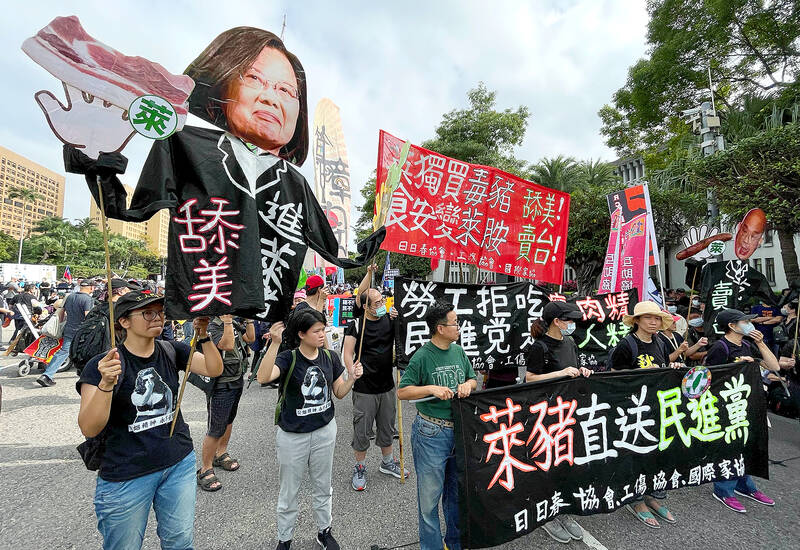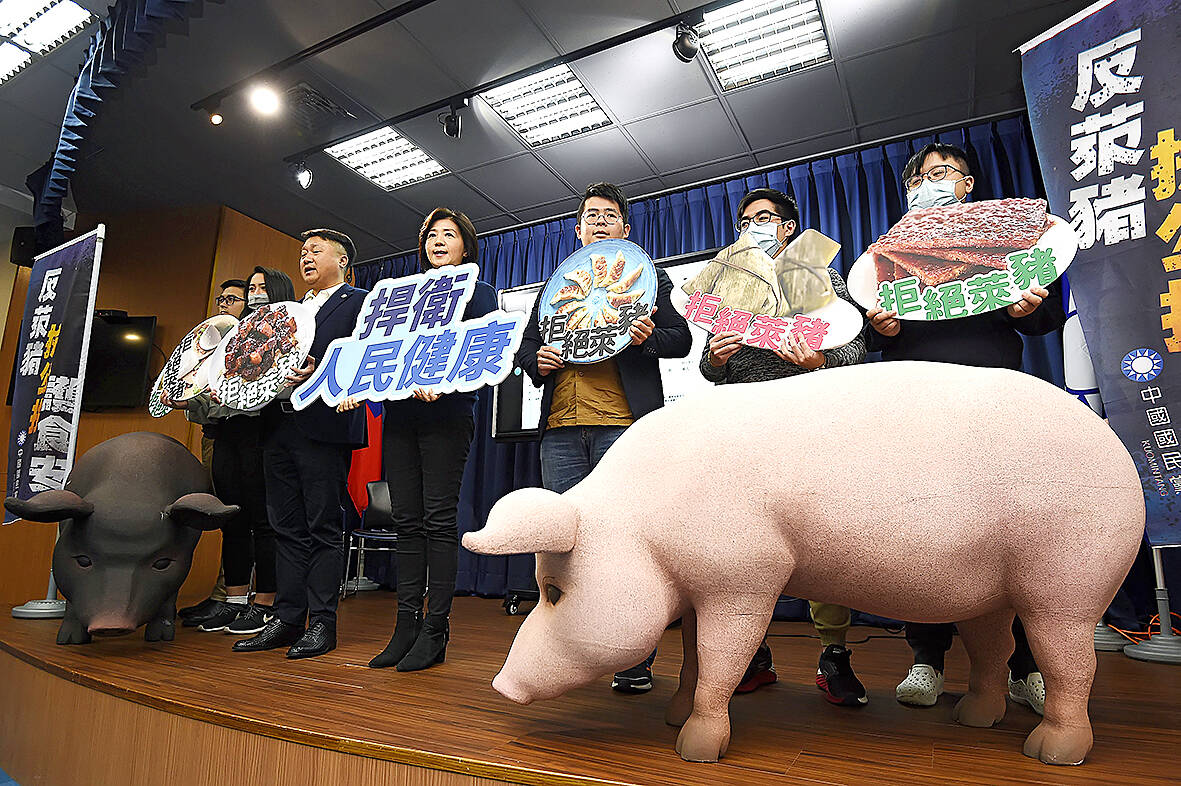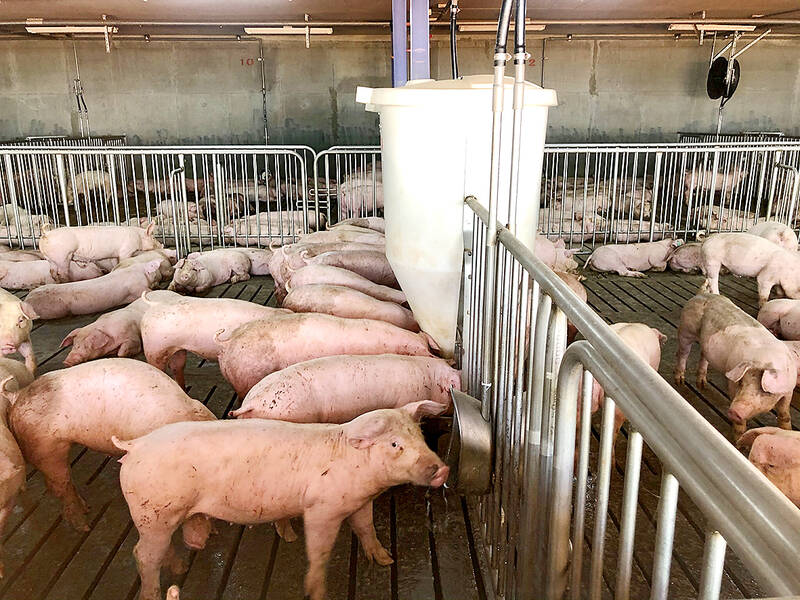In European and Asian wild boar populations, the number of chromosomes is generally 36, with some having more thanks to interbreeding with domestic pigs, which usually have 38 chromosomes.
Genetic studies show that the “boars” of Taiwan all have 38 chromosomes, indicating that they are not true wild boars but domesticated pigs gone wild. Hence, as agricultural researchers have noted, they do not fall under the Wildlife Conservation Act.
They don’t contain ractopamine either.

Photo: Liu Hsin-te, Taipei Times
What ever happened to the dreaded ractopork issue? Less than a year ago it was the subject of one of four referendums aimed at the Democratic Progressive Party (DPP) by the Chinese Nationalist Party (KMT), which positioned them as a vote of confidence in the administration. They failed, a clear win for the DPP.
The US had expressed worry that a rejection of ractopamine might complicate negotiations with Taiwan. Voters showed clear pragmatism. Indeed, that vote, in conjunction with public’s sensible 2018 vote on the hideous moniker “Chinese Taipei” for international sporting events, offer a stern rebuttal to the periodic cry from commentators that radical Taiwanese could declare independence at any moment and plunge the region into war.
Given the choice of sending pointless messages, or pragmatically preserving relationships with the outside world, Taiwanese voters chose the latter. Time for some trust, world.

Photo: Chen Chih-chu, Taipei Times
NO ISSUE
The prohibition of ractopamine was lifted on Jan. 1 of last year, ending a long ban on the drug. President Tsai Ing-wen (蔡英文) had announced the decision on August 28, 2020. The government followed with a package of subsidies for farmers.
The move was widely expected to have a profoundly negative effect on the pork industry. A 2016 government study calculated that Taiwan’s pork farmers would take an NT$14.3 billion hit. Fear was widespread.

Photo: Chen Chih-chu, Taipei Times
The industry was in the doldrums, still reeling two decades after an outbreak of foot-and-mouth disease had destroyed Taiwan’s pork export market. Farmers claimed that consumers would give up pork completely.
A year later, the two-decade struggle over ractopamine, with its entertaining flip-flops by both major parties over the years, looks silly. Government figures released last February showed that pork consumption actually grew year on year the first month the ban was lifted.
The media hype instantly evaporated, a miniature case study: the international media was happy to hype ractopork tensions, but once it turned out there was no issue, and no more clicks to be had, it moved onto the next big hype. Articles that announce “nothing happened” don’t get eyes. Follow up? We need another piece on the fake claw machine “craze.”

Photo: Tsung Tsang-chin, Taipei Times
BEATING EXPECTATIONS
Many commentators expected the DPP and Tsai to take a popularity hit. Polls late in 2020 indicated disapproval of the ractopamine policy.
The Taiwan Public Opinion Foundation (TPOF) found that food security was an area of dissatisfaction (49 percent) in a December poll, while a November TPOF poll showed 66 percent disapproved of the decision to lift the ban. There were public protests, and the pro-China opposition parties staged events to highlight the farmers’ problems.

Photo: Lo Chi, Taipei Times
All that evaporated as pollsters lost interest (recall any recent polls on the question?). The president’s polling has been solid, and the DPP has by far the highest identification of any of the major parties. Nobody talks about ractopamine now. Taiwan produces more pork than it does the next three leading types of meat combined. Over 8 million pigs are slaughtered each year, the product of around 7,000 farms, 75 percent of which are considered small.
The industry is facing major problems this year. Pork prices have plummeted, yet feed prices have risen, squeezing small producers out of the business. Others have scaled back production hoping to push up prices. The government is putting in programs to help reduce the industry’s environmental effects and enhance its technologies.
On the pork industry’s long list of problems, imports from the US are a pimple. (The feed issue highlights Taiwan’s food security issues: 90 percent of it is imported, meaning that government attempts to get feed producers to increase output will have little effect on the overall situation. People often imagine Taiwan as nearly self-sufficient in pork, but in reality, pork is simply assembled rather than produced here. If Taiwan is blockaded, meat production will die off.)
Far from taking a hit, Tsai’s political gamble that the US would respond positively paid off in August of this year when the US announced for the 1,345,613th time that it would initiate negotiations on a bilateral trade agreement with Taiwan, launching the “US-Taiwan Initiative on 21st Century Trade” (the phrase “21st Century” indicates when the negotiations results will appear).
An article by a pair of prominent Asia watchers previously warned that it could be a while before the Biden administration even gets around to thinking about a trade agreement. In December of 2020 Biden, then president-elect, said he would not be rushing into trade deals.
Once again, the Tsai administration beat expectations and negative results did not occur.
CONTRASTING RESULTS
It is interesting to contrast the tranquil results of Tsai’s decision-making with that of the Ma Ying-jeou (馬英九) administration. Recall that the ractopamine issue was brought up again by the Ma administration (which had begun ractopamine testing in 2011, though the DPP banned it in 2006, they had never tested for it), while negotiating the services pact with China.
It was not a coincidence that the KMT had revved up the ractopamine issue, but part of a strategy to use the issue to irritate relations with the US and push Taiwan toward China, a strategy it deployed again last year with the ractopamine referendum. It also exploited that issue in the Ma years to put the DPP at odds with US interests.
Yet, during the Ma years, the largest exporter of pork products to Taiwan was not the US, but Canada (which passed the US in 2009). If the effect of pork imports on Taiwan’s markets had really been the issue, Ma and the farmers would have complained more about Canada.
Tsai has reversed all that. With the announcement of large increases in defense spending in the next fiscal cycle, she has basically given Washington all it has asked for, quietly, reliably and pragmatically.
The president’s pragmatism and incrementalism are, by and large, the traits of her people. It’s time for the trope of a Taiwan populated by madmen ready to plunge the region into war to be banished from commentary. Madness is a trait of the sociopaths of Zhongnanhai, not the Taiwanese resisting them.
Time also to reward President Tsai with some reciprocity. Munitions, please, in quantity. And a trade pact.
Notes from Central Taiwan is a column written by long-term resident Michael Turton, who provides incisive commentary informed by three decades of living in and writing about his adoptive country. The views expressed here are his own.

Taiwan doesn’t have a lot of railways, but its network has plenty of history. The government-owned entity that last year became the Taiwan Railway Corp (TRC) has been operating trains since 1891. During the 1895-1945 period of Japanese rule, the colonial government made huge investments in rail infrastructure. The northern port city of Keelung was connected to Kaohsiung in the south. New lines appeared in Pingtung, Yilan and the Hualien-Taitung region. Railway enthusiasts exploring Taiwan will find plenty to amuse themselves. Taipei will soon gain its second rail-themed museum. Elsewhere there’s a number of endearing branch lines and rolling-stock collections, some

Could Taiwan’s democracy be at risk? There is a lot of apocalyptic commentary right now suggesting that this is the case, but it is always a conspiracy by the other guys — our side is firmly on the side of protecting democracy and always has been, unlike them! The situation is nowhere near that bleak — yet. The concern is that the power struggle between the opposition Chinese Nationalist Party (KMT) and their now effectively pan-blue allies the Taiwan People’s Party (TPP) and the ruling Democratic Progressive Party (DPP) intensifies to the point where democratic functions start to break down. Both

The Democratic Progressive Party (DPP), Chinese Nationalist Party (KMT), and the country’s other political groups dare not offend religious groups, says Chen Lih-ming (陳立民), founder of the Taiwan Anti-Religion Alliance (台灣反宗教者聯盟). “It’s the same in other democracies, of course, but because political struggles in Taiwan are extraordinarily fierce, you’ll see candidates visiting several temples each day ahead of elections. That adds impetus to religion here,” says the retired college lecturer. In Japan’s most recent election, the Liberal Democratic Party lost many votes because of its ties to the Unification Church (“the Moonies”). Chen contrasts the progress made by anti-religion movements in

This was not supposed to be an election year. The local media is billing it as the “2025 great recall era” (2025大罷免時代) or the “2025 great recall wave” (2025大罷免潮), with many now just shortening it to “great recall.” As of this writing the number of campaigns that have submitted the requisite one percent of eligible voters signatures in legislative districts is 51 — 35 targeting Chinese Nationalist Party (KMT) caucus lawmakers and 16 targeting Democratic Progressive Party (DPP) lawmakers. The pan-green side has more as they started earlier. Many recall campaigns are billing themselves as “Winter Bluebirds” after the “Bluebird Action”